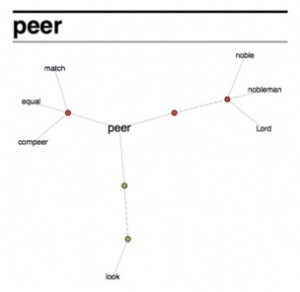Thanks to Leo Bottary at Vistage International for Permission to Reproduce His Content.
Let me start by saying I don’t mean “peer” the verb. I’m not asking about the creepy type of peer which is defined by dictionary.com as 1) to look narrowly or searchingly, as in the effort to discern clearly; 2) to peep out or appear slightly; or 3) to come into view. I’m talking about the noun, which is also used as an adjective in the case of peer group. The dictionary.com definitions are as follows: 1) a person of the same legal status: a jury of one’s peers; 2) a person who is equal to another in abilities, qualifications, age, background, and social status; 3) something of equal worth or quality: a sky-scraper without peer; 4) a nobleman; 5) a member of any of the five degrees of the nobility in Great Britain and Ireland (duke, marquis, earl, viscount, and baron). One advantage to researching questions like this is stumbling upon cool online tools like the new visual thesaurus. Here’s what “peer” looks like through the lens of the visual thesaurus:
 So what we know about the word “peer” is that it’s rooted in nobility and common status. We also know that while words have definitions, they also carry connotations that evolve over time and influence the very meaning of words and how they are interpreted. So if you asked someone to define the word peer, or to describe a peer, they might respond by saying, “Someone like me.” While that’s partly true, it doesn’t mean you can’t have peers who are very different from you as well. When you think of the word peer in this way, you can start to consider the implicit value of peer diversity.
So what we know about the word “peer” is that it’s rooted in nobility and common status. We also know that while words have definitions, they also carry connotations that evolve over time and influence the very meaning of words and how they are interpreted. So if you asked someone to define the word peer, or to describe a peer, they might respond by saying, “Someone like me.” While that’s partly true, it doesn’t mean you can’t have peers who are very different from you as well. When you think of the word peer in this way, you can start to consider the implicit value of peer diversity.
The very notion of peer diversity may feel like a number of successful industry-specific peer groups out there. While industry-specific peer groups can be valuable, people typically join them because they assume they will learn more and receive the best advice from people who already understand the nuances of their business. This is where I would suggest that there’s additional value to be gained from a peer group with greater diversity – one whose members operate outside your everyday world.
By broadening your definition of peer, it allows you to consider working with people who may be from very different industries and backgrounds, but who share common challenges and similar aspirations. In this type of group, you become exposed to strategies and practices that are everyday occurrences in some sectors yet completely foreign to your own. You’ll find yourself leveraging the diversity of expertise in disciplines common to your organizations (HR, communication, finance, etc.) and sharing similar experiences from your respective work environments.
To illustrate the point in a different context, let me offer a brief anecdote: Years ago, I founded my own PR firm in Florida; I had a terrific team and a healthy list of great clients including McDonald’s, Sprint PCS, CSX Transportation, etc. Turns out Wal-Mart needed an agency in North Florida to assist with opening a new store. I believed that with all our team retail experience, we were the perfect fit for this assignment. In making our case to Wal-Mart, I touted our retail experience, great list of clients, blah, blah, blah. We lost the opportunity to work with Wal-Mart because they didn’t care about our retail experience. (They have some of that already as you might have guessed!) What they needed was a firm that really understood all the other issues involving the local community – areas where Wal-Mart lacked the requisite expertise.
The point is: You don’t need to surround yourself with people who know what you know; you need to engage people who know things you don’t know. When you think of it this way, it’s easy to see how much additional value you can glean from people outside your industry. If nothing else, a peer advisory group that offers greater diversity can serve to augment the advice you’re receiving from your industry colleagues.
Peer diversity is not an oxymoron. Whether you’re a member of an industry peer group or not part of a group at all, consider joining a peer advisory group comprised of members outside your industry. Give it six months and you’ll be astonished at what you will learn and how much you will contribute to others. If you’re not convinced, consider this quote about curiosity from Seth Godin: “A fundamentalist considers whether a fact is acceptable to their faith before they explore it. A curious person explores first and then considers whether they want to accept the ramifications.” Be curious!
